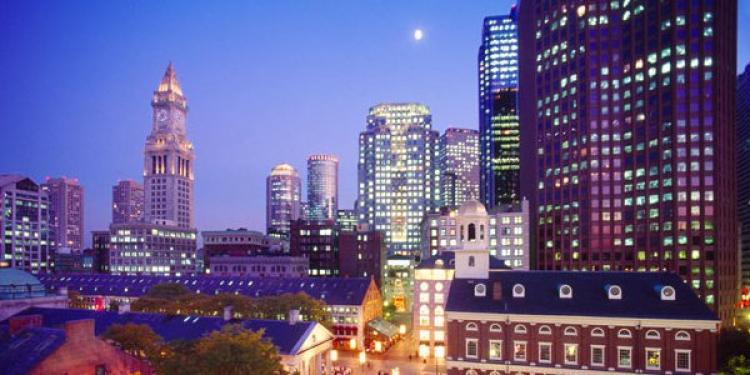Boston Bids to Become the American Singapore as Atlantic City Casinos Die
Posted: October 1, 2014
Updated: June 4, 2017

Boston is throwing its hat in the ring as a new gambling hotspot on the East Coast, drawing inspiration from Singapore. It looks to be successful, but will it become a regional hub?
Since the late 1970s the commercial casino industry in America has largely been a tale of two cities. Las Vegas held things down in the west while East Coast gamblers took their business to the Jersey Shore resort town of Atlantic City. Las Vegas was always the bigger, richer and more glamorous of the two, but Atlantic City was home to a billion-dollar casino industry as well, peaking at $5.21 billion in 2006.
Since that bumper crop, however, Atlantic City is dying a painful but not so slow death. By the end of 2014 three casinos will have closed and thousands of people thrown out of work. Will Las Vegas be left without a major gambling city sister on the country’s east coast? Not if pro-gaming public officials and casino investors can help it.
Massachusetts is creating a commercial casino market for the first time
American gambling laws give states a close-to-free reign to regulate their own casino industries, and Massachusetts has long been one of the most puritanical states, banning commercial casinos in the early 20th Century. In 2012, however, a referendum passed to amend the state constitution and allow the state government to issue commercial casino licenses.
• Wynn Resorts will build a $1.6 billion resort casino just outside of Boston
• Singapore, not Atlantic City, is providing the inspiration for the gambling market in Massachusetts
• Expect locals and well as tourists to visit Boston to gamble
After endless public debate and jockeying for position among several big casino operators, the state issued a license to MGM to build a casino in rural western Massachusetts. The real news, however, came last week when the state issued a license to Wynn Resorts to build and operate an integrated resort casino in the Boston suburb of Everett.
At a cost of $1.6 billion, Steve Wynn’s new casino will be impressive. It will have to be, as it will compete for market share on the densely populated but geographically small eastern seaboard, where New Jersey, Connecticut, Pennsylvania and Maryland all have casino markets. New York is debating bringing casino gambling to the upstate area as well.
Boston will face stiff competition, but it has some inherent advantages unshared by other states in the region. For one, it’s a prime tourist destination even without casinos, something that New Jersey, Connecticut and Pennsylvania certainly can’t boast. In addition, it’s unlikely to repeat the mistakes that Atlantic City made.
Boston plans to limit the growth of its market, just like Singapore
Atlantic City is in decline because its casino industry got too big, too fast. Built mostly during the 1980s when American poker rooms and casinos were few and far between, the city’s economy became dependent on gambling as its near-sole source of employment and tax revenue.
Casino investors were also under the illusion that the good times would never end, so they kept building. By 2014 the city of 50,000 had 12 large-scale casinos. When surrounding states built their own gambling establishments and cut into Atlantic City’s market share they were left with expensive investments attracting few customers, and the city was left with nothing to fall back on.
Massachusetts lawmakers are learning from that mistake, and have a vision more like Singapore, a large city with a casino market that is limited in size. As things stand, the Wynn casino in Everett will be Boston’s only casino. At the same time it will be large enough to produce a hefty amount of tax revenue for the state.
Boston’s appeal and location near major population centers like New York City, Toronto and to a lesser-extent Washington DC should help it pull in large numbers of tourists with money to spend, just as Singapore has done in cashing in onits location in the South China Sea.
But that’s where the similarities stop. Singapore’s casinos pulled in $6.2 billion in revenue in 2013 largely by serving wealthy gamblers from China, India and Japan. Boston is looking to follow Singapore’s model, but there is little chance it will be as successful due to the fact that the American market is already close to saturation.
It does have an extra advantage, however. Singapore gambling laws attempt to restrict gambling on the part of locals as much as possible without banning it completely. Citizens of the country can gamble but must pay heavy fees in order to gain admission to a casino.
By contrast, Steve Wynn plans to cash in on Boston’s sizeable domestic market. One of the largest cities in America, a resort casino there won’t have to be completely dependent on tourists, which has been one cause of Atlantic City’s downfall.
Will Boston become the next big east coast gambling hub?
The powers-that-be in Massachusetts are certainly doing things the right way, emphasizing sustainability and profitability over size. If things go well state lawmakers may issue more licenses, but for now they’ll let Steve Wynn do his thing.
What are the chances that Boston becomes a regional center for gambling? Pretty slim, to be honest. Expect Wynn’s operation to do well, but he will still be competing in a market that is close to saturation. The East Coast is now made up of a mixture of small gambling centers as well as the first-ever online casinos in America in New Jersey and Delaware.
The days of American gambling being a tale of two cities are long gone. These days there is Las Vegas, and there is everyone else.













